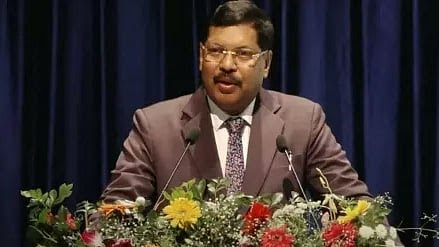London/Prayagraj: Chief Justice of India (CJI) B.R. Gavai has expressed serious ethical concerns over judges accepting government roles or joining politics soon after retirement. Speaking at a roundtable hosted by the UK Supreme Court, he warned such practices threaten the independence and public trust in the judiciary.
CJI Gavai pointed out that judges stepping into political or government positions immediately after retirement can lead to a perception that judicial verdicts were influenced by personal ambitions. “A judge resigning to contest elections or taking a government appointment right after retiring invites public scrutiny and raises doubts about impartiality,” he stated, as reported by LiveLaw.
He emphasised that such moves may appear as attempts to curry favour with the government. “The timing and nature of post-retirement engagements can erode the public’s confidence in the judiciary’s neutrality,” he said.
To maintain credibility, CJI Gavai revealed that he and several of his colleagues have pledged not to accept any post-retirement posts offered by the government. “This is our effort to preserve the judiciary’s independence,” he affirmed.
His comments come amid growing debate in India over the increasing number of judges accepting high-profile roles from the executive branch shortly after stepping down.
Several examples were cited:
Justice Ranjan Gogoi, former CJI, was nominated to the Rajya Sabha just four months after retirement. He was part of landmark judgments including the Ayodhya verdict and Rafale deal.
Justice S. Abdul Nazeer was appointed Governor of Andhra Pradesh within 40 days of retirement. He was also on the Ayodhya and demonetisation benches.
Justice P. Sathasivam became Governor of Kerala in 2014 after serving as CJI.
Justice Ranganath Misra served as NHRC chair in 1993 and was nominated to Rajya Sabha in 1998.
Justice Baharul Islam joined Rajya Sabha months after retirement, having cleared a former Bihar CM in a corruption case.
Justice Fathima Beevi served on the NHRC and as Tamil Nadu Governor from 1997 to 2001 after retiring in 1992.
Justice M. Hidayatullah served as Vice President of India from 1979 to 1984.
Justice M.C. Chagla resigned as Bombay HC Chief Justice in 1958 to become India’s Ambassador to the U.S., appointed by PM Nehru.
The issue has long sparked concern over whether post-retirement perks compromise the integrity of India’s highest courts. CJI Gavai’s strong words are likely to revive discussions on ensuring judicial independence is not sacrificed for political or personal gain.




